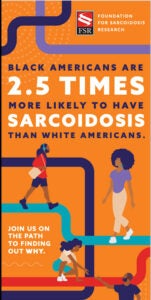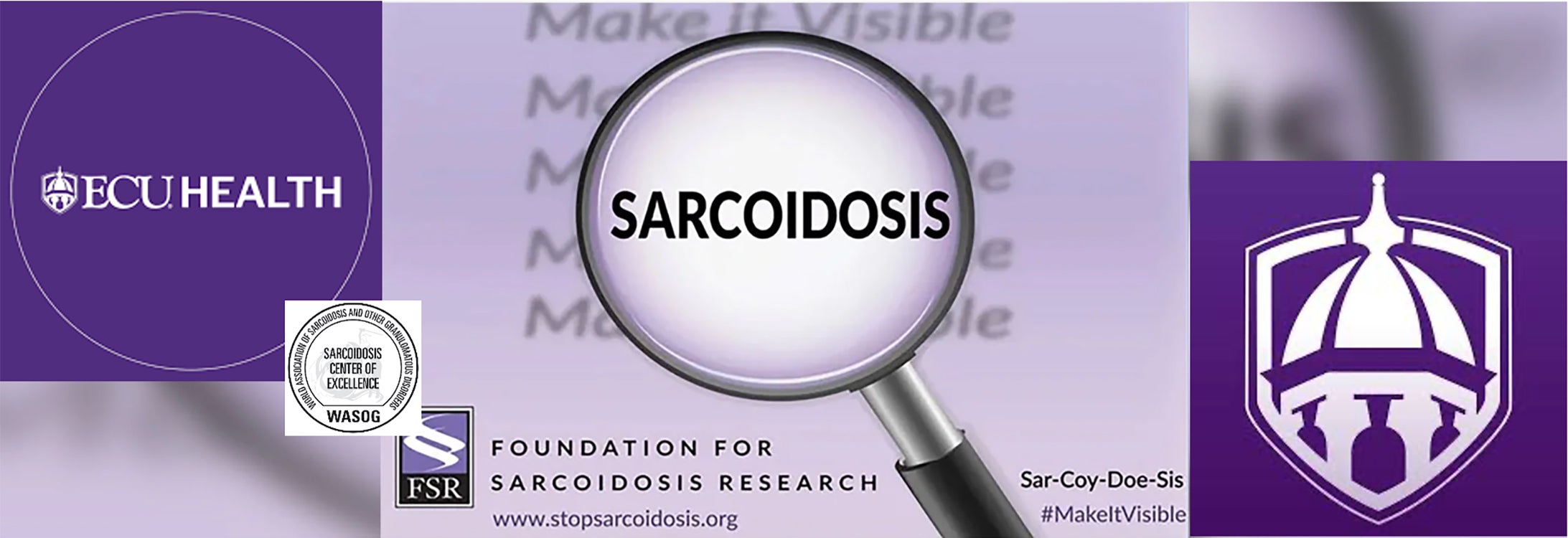Research
The ECU Sarcoidosis Center of Excellence is dedicated to conducting cutting edge research in sarcoidosis with a goal to improve the lives of patients living with sarcoidosis. Our research focuses on learning more about potential causes of sarcoidosis including severe forms of sarcoidosis (such as fibrotic pulmonary sarcoidosis), discovering better treatment options, and understanding factors that impact quality of life in patients with sarcoidosis. Conducting research is vital to improving our understanding of sarcoidosis and the success of research is dependent on having informed and engaged patients.
Patients can participate in clinical research at various levels such as:
- Enrollment in patient registries
- Donation of blood and other tissue samples
- Participation in surveys
- Clinical Trials
What is a clinical trial?
A clinical trial is a study that looks at new ways to prevent, detect, or treat disease. Treatments may be new medications, devices, or surgical procedures to treat disease and in some cases may be new ways to use existing therapies. Clinical trials are necessary to understand if a new treatment is safe, effective and well tolerated.
Why should I participate in a clinical trial?
The main reason to participate in a clinical trial is to help someone and the person helped might be yourself because you are hoping to find a new treatment that works for you. Some people might also participate in a clinical trial because it will help others, such as a family members or others suffering from the same condition. Even healthy volunteers say they participate to help others, as they have nothing to gain from the therapy itself. Participation in a clinical trial may also afford the opportunity for you to work more closely with your doctor and in some cases, to gain early access to new therapies.
How do I know that clinical trials are safe?
There is a long road before a new therapy or medication is ready for human trials. There must be testing in the laboratory before the Food and Drug Administration (FDA) will allow for studies to begin in humans. An Institutional Review Board (IRB) reviews the study application and all materials prepared for the study to assure that your rights and safety have been addressed. There is also constant monitoring by the investigative team as well as central reviewers and a Data Safety Monitoring Committee, who reviews data periodically, to assure there are no safety issues with the new medication.
How do I find out if a clinical trial is right for me?
Not all clinical trials are a good fit for everybody. Some clinical trials are short and intense, with frequent and long study visits, while others may last for many months, but do not require so many visits. The medication or therapy being studied should be of interest to you, and then you can discuss the schedule to know if it would work with your other activities. A lot of clinical trials will provide a small stipend for participation and in some cases may be able to cover the cost of transportation, childcare, and food on study visit days. Please discuss any concerns you have with your provider and ask what resources are available to support you should you decide to participate.
How do I find out more about clinical trials at ECU Sarcoidosis Center of Excellence?
There are several ways to learn more about clinical trials ongoing at ECU Sarcoidosis center of Excellence. You can ask your doctor about available sarcoidosis clinical trials, Search the ECU pulmonary research page, contact the ECU Pulmonary Clinical Trials office at 252-744-1116, or email Dr. Anagha Malur at malura@ecu.edu.
Calling for increased clinical trial participation in Black patients and minorities with sarcoidosis:
Sarcoidosis occurs more commonly in Black individuals who are also more likely to have more severe disease and worse outcomes. The ECU Sarcoidosis Center of Excellence has partnered with the Foundation of Sarcoidosis Research (FSR) through the ACTe (Advance Clinical Trials for Equity) now campaign to encourage Black patients with sarcoidosis to participate in clinical trials.

